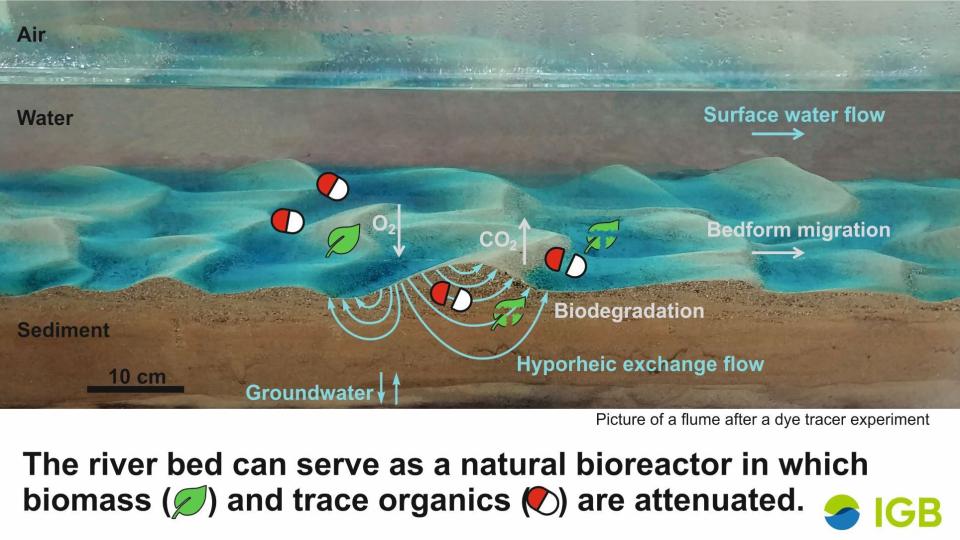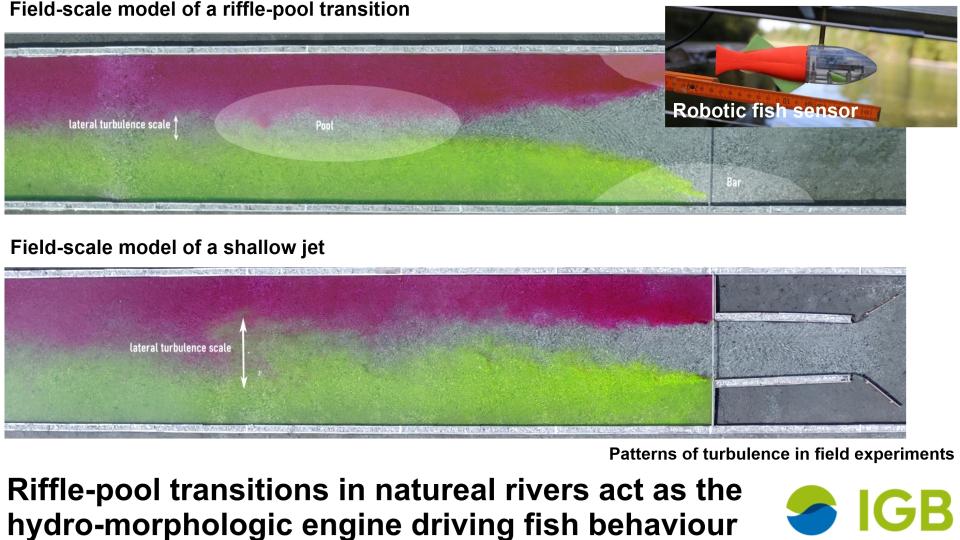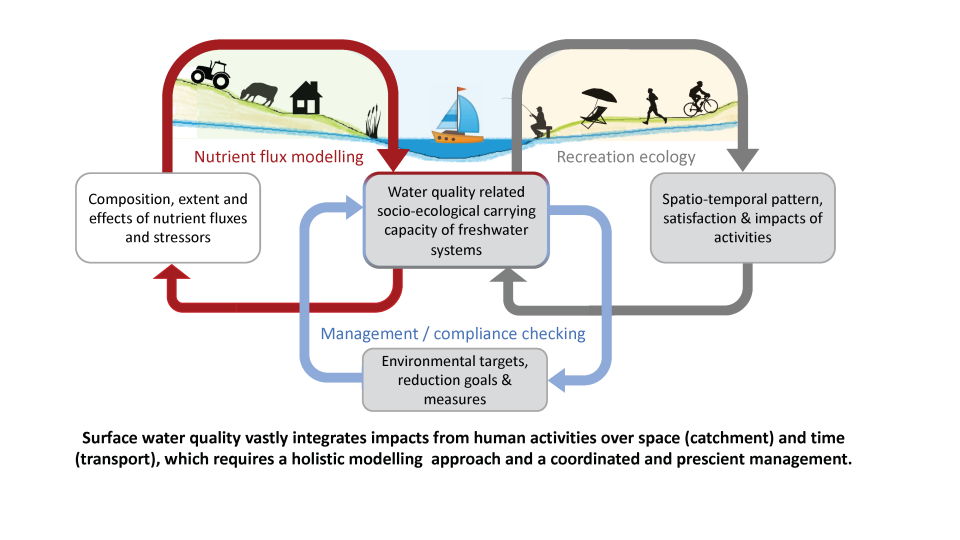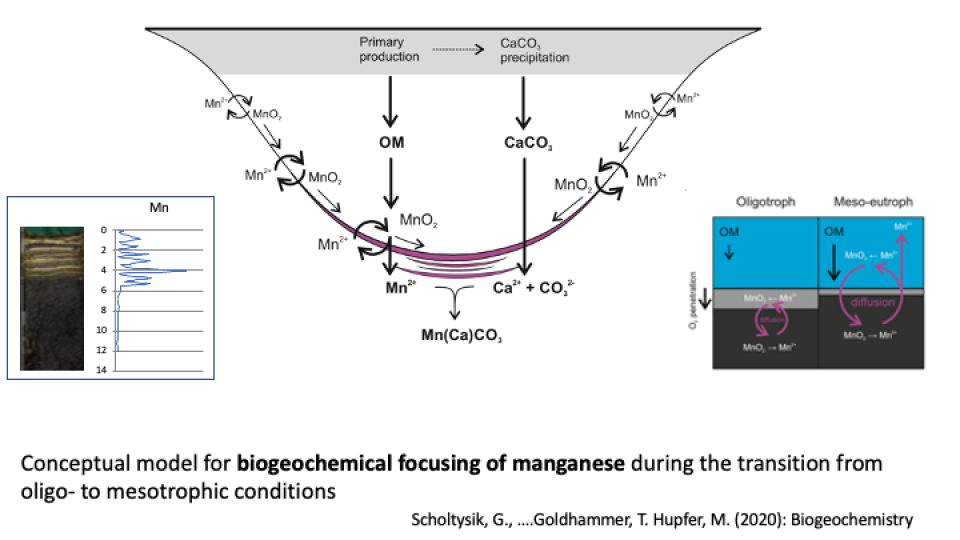(Dept. 1) Ecohydrology and Biogeochemistry
The interactions within and between green water (in terrestrial systems) and blue water (lakes, rivers, and subsurface aquifers) affect in complex ways the habitats for organisms and the reactive transport of abiotic components. Aquatic and terrestrial systems are coupled at multiple spatio-temporal scales. The overall goal of the Department of Ecohydrology and Biogeochemistry is to understand the ecohydrological and biogeochemical processes of these connected land- and waterscapes in natural, rural and urban environments. Therefore, our research projects focus on the following core topics:
- Interactions of landscape-freshwater ecosystems
- Physical and biogeochemical drivers under global change
- Water security in disturbed and urban systems
In our research, we integrate different modelling approaches with data collected in field studies, in large-scale manipulation studies, by long-term monitoring and in laboratory experiments. We study ecohydrological and biogeochemical processes using a variety of tracer techniques, particularly stable isotopes, and by measuring naturally dissolved solutes, conservative geogenic ions, trace organic matter, and nutrients. In doing so, we combine basic research with application aspects and aim to record and model the effects of climate and land use changes. With its laboratory infrastructure and expertise in the fields of inorganic and organic analysis as well as isotope measurement, the department performs a central function for the entire institute. To achieve our research goal, we combine our professional expertise from the research disciplines of hydrology, geochemistry, aquatic physics, ecology, environmental engineering, and geography.

Landscape Ecohydrology, Research group of Dörthe Tetzlaff, Graphic: Dörthe Tetzlaff / IGB

Ground Water-Surface Water Interactions, Research group of Jörg Lewandowski, Graphic: Jörg Lewandowski / IGB

Physical Limnology, Research group of Georgiy Kirillin, Graphic: Georgiy Kirillin / IGB

Organic Contaminants, Research group of Stephanie Spahr, Graphic: Stephanie Spahr / IGB

Ecohydraulics, Research group of Alexander Sukhodolov, Graphic: Alexander Sukhodolov / IGB

Nutrient Cycles and Chemical Analytics, Research group of Tobias Goldhammer, Graphic: Tobias Goldhammer / IGB

River System Modelling, Research group of Markus Venohr, Graphic: Markus Venohr / IGB

Biogeochemical Processes in Sediments and Lake Management, Research group of Michael Hupfer, Graphic: Michael Hupfer / IGB
Research groups
Department members
Selected publications
Sub-daily stable water isotope dynamics of urban tree xylem water and ambient vapor
The authors combined in situ monitoring of stable isotopes and ecohydrological monitoring in different urban vegetation in Berlin. They provide novel insights on plant physiology and hydrological functioning through high-resolution isotope data to capture sub-daily plant water uptake and internal water cycling.

A tiered complexity conceptual framework for treating water soluble, hydrophilic contaminants in green stormwater infrastructure
Blue-green infrastructure is a critical tool for improving stormwater quality, but the removal of dissolved, hydrophilic contaminants remains a major challenge. The authors propose a tiered conceptual framework of progressively more complex, costly, and resource-intensive interventions to remove dissolved, hydrophilic contaminants and thus minimize risks to ecosystems and drinking water sources.
Hydrological Processes in Lowlands and Plains
Lowlands and plains provide important ecosystem services such as agricultural and forestry production, groundwater recharge, streamflow generation and drinking water supply. This Special Issue collects scientific papers advancing understanding of the mechanisms underlying the movement and storage of water in lowland and plain environments.
From Soil to Sediment: Bedform Migration Shapes Microbial Communities From Eroding Bank Soil During Terrestrial–Aquatic Regime Shift
The authors tested the impact of simulated ripple migration on two types of river sediment, namely aquatic sediment and incoming soil from eroding riverbanks, and compared them to stationary conditions in a microcosm experiment. Ripple migration influences community dynamics and microbial metabolism and decelerates the colonization of incoming soil from eroding riverbanks.
The Role of Beaver Dams in Modulating Hydrological Connectivity and Nutrient Dynamics in Agricultural Catchments With Intermittent Streams
Beaver dams and associated wetlands can alter hydrological connectivity and biogeochemical processes,, but their combined influence on nutrient dynamics remains understudied. The authors investigated the effects of a network of beaver-impacted waters on macronutrients dynamics in an intermittent stream network showing the effectiveness of beaver created wetlands as nature-based solutions.









